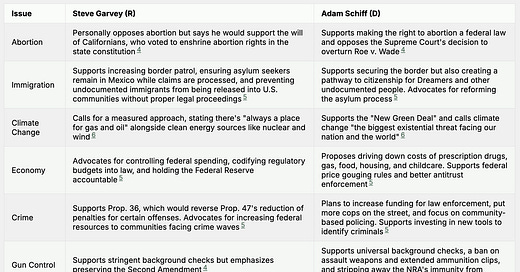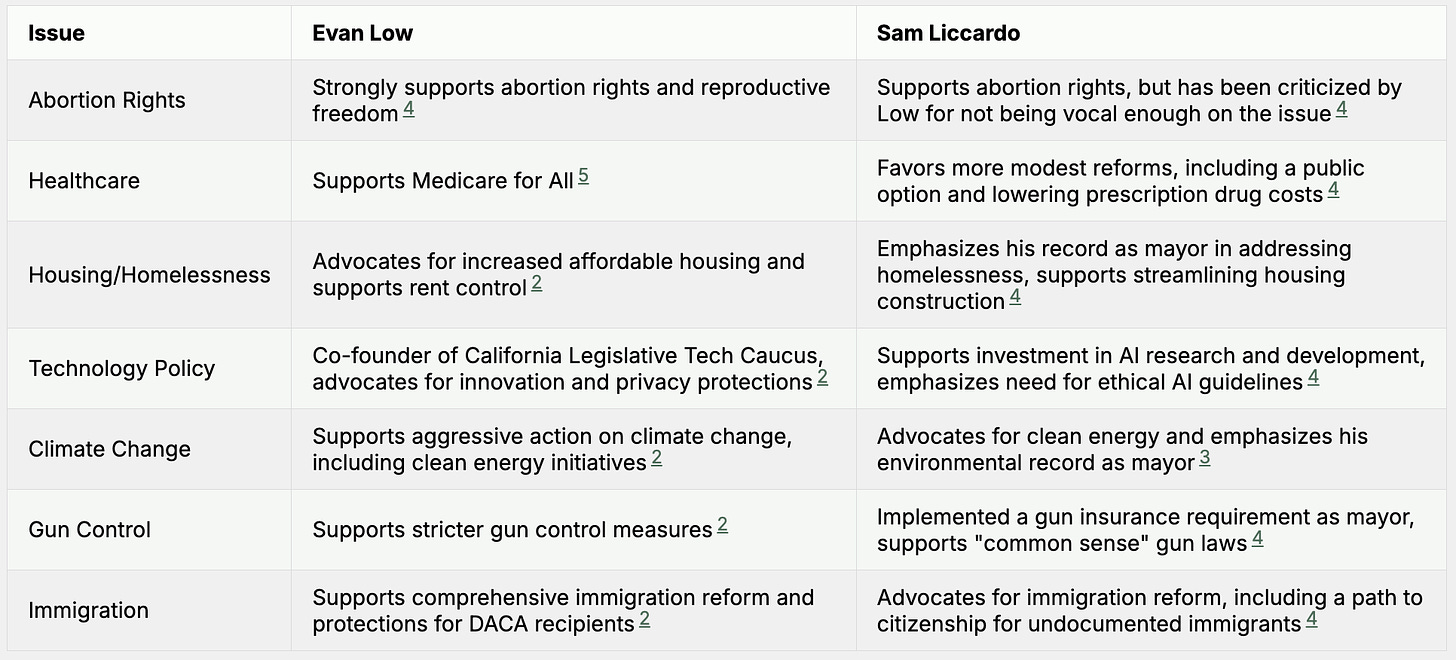Misinformation, dark money internet trolls, and deep-fakes: these are the issues that try men’s souls regarding AI and elections. But there’s another aspect that politicians don’t talk about as much – though they should. If you ask AI to help you research and recommend candidates, what does it say? Is it biased, a helpful tool, both? People often use AI as a replacement for Google. So if search results are biased, how are AI chats?
Anyone who lives in California knows that a ballot resembles a textbook – more of a Das Kapital than a lightweight Communist Manifesto – oversized envelopes carried by burdened postmen in their righteous democratic quest.
I wanted to know what AI thinks of the litany of federal, state, and local elections – plus propositions 2, 3, 4, 5, 6, 32, 33, 34, 35, 36, G, and AA? (the last two being specific to Mountain View, where I live).
Key Points From This Post
It’s easy to create tables comparing candidates’ positions automatically, even in lesser known elections.
AI can be strongly influenced by its source material, like newspaper endorsements that people might not otherwise read.
It can help fact check issues or double check figures, like getting Adam Schiff’s actual campaign rhetoric on price controls, or CA’s state budget – all with proper citations, which themselves can be brought in easily to chat with.
AI can help quickly identify the rough political valence of the candidate, including intra-party distinctions (moderate vs. radical) much more easily, I find, than using Wikipedia or relying on campaign ads.
It can be helpful to get more political context on issues. For Prop 34, it let me know that it is primarily targeting one organization, the AIDS Foundation, which is using its money to support rent control and purchase real estate (widely reported, but perhaps not widely known to voters).
You can find all of my notes in an Abbey Workspace. An outline tab on the right side was automatically generated by Abbey to organize everything by office. Nearly every note in the workspace was saved with one click from a chat which used Abbey’s “Use Web” feature with Claude Sonnet 3.5 selected. See the Workspace on Abbey to view the proper citations.
U.S. Senate
First, let’s get biographies for each candidate:
Steve Garvey:
Steve Garvey is a former Major League Baseball player running as a Republican candidate for U.S. Senate in California. Born in Tampa, Florida, Garvey earned a B.S. from Michigan State University. He played first base for the Los Angeles Dodgers and San Diego Padres from 1969 to 1987, becoming a 10-time National League All-Star. After his baseball career, Garvey founded Garvey Marketing Group and worked with various charitable causes. This is Garvey's first time running for political office.
Adam Schiff:
Adam Schiff is a Democratic congressman who has represented communities in Los Angeles and the San Gabriel Valley for nearly three decades. Born in 1960, Schiff worked as an assistant U.S. attorney before being elected to the California State Senate in 19963. He was elected to the U.S. House of Representatives in 2001 and is currently serving his 12th term. Schiff gained national prominence as chair of the House Intelligence Committee from 2019 to 2023 and for his role in leading the first impeachment of President Donald Trump. He also served on the January 6th committee investigating the Capitol attack.
Now, let’s dig into the issues with a table comparing their stances:
After reading this, I was interested in Schiff’s stance on “price gouging rules” – is that really important to him? I saw that the source was a KTVU article, so I opened a chat with just that article, and asked for more. Something interested me there:
Grocery Industry Focus: Schiff highlights the concentration of power in the grocery industry as an example, noting that "more than 60% of America's grocery sales are now concentrated within just four companies, creating a virtual monopoly that is causing higher prices for shoppers and fewer grocery store job opportunities"
I asked, “What is the profit margin of a typical grocery store?” Answer: 2.2%.
U.S. House
This is a highly contested election between Evan Low and Sam Liccardo (both Democrats) to replace a long-serving Representative.
Here are brief biographies of Evan Low and Sam Liccardo, who are both candidates for U.S. Representative in California's 16th congressional district:
Evan Low:
Evan Low is a Democratic politician currently serving in the California State Assembly, representing the 26th Assembly District.
Some key points about Low's background and career:
Born in 1983 in San Jose, California
Elected to the Campbell City Council in 2006 at age 23
Became mayor of Campbell in 2009, making him the youngest openly gay Asian American mayor in the nation at age 26
Elected to the California State Assembly in 2014
Has served as Chair of the California Asian American & Pacific Islander Legislative Caucus
Co-founder and co-chair of the California Legislative Tech Caucus
Focused on issues like technology policy, LGBTQ+ rights, and affordable housing in his legislative career
Low is running for Congress on priorities including protecting abortion rights, lowering the cost of living, addressing homelessness, and promoting technology and innovation.
Sam Liccardo:
Sam Liccardo is a Democratic politician who most recently served as the mayor of San Jose, California from 2015 to 2022. Key points about Liccardo's background:
Born in 1970 in Saratoga, California
Graduated from Georgetown University and Harvard Law School
Worked as a federal prosecutor and criminal prosecutor for the Santa Clara County District Attorney's Office
Elected to the San Jose City Council in 2006
Elected mayor of San Jose in 2014 and re-elected in 2018
As mayor, focused on issues like pension reform, economic development, homelessness, and environmental initiatives
In his congressional campaign, Liccardo has emphasized his record as mayor and his plans to address issues like the cost of living, public safety, and technology policy.
Both candidates are vying to replace retiring U.S. Representative Anna Eshoo in California's 16th congressional district.
As you can see, it’s very easy to pinpoint Sam Liccardo as the moderate from this table.
Other Elections and Propositions
Here is Abbey’s concluding comment on a judicial race:
It's worth noting that while both candidates have significant experience in the District Attorney's Office, Boyarsky has taken on more administrative roles in recent years, while Stebbins has maintained a focus on prosecutorial work. The San Jose Mercury News editorial board favors Boyarsky, citing his management experience and broad support.
This paragraph mentions the Mercury News’ endorsement of Boyarsky’s for the second time in its response, giving Boyarsky the last word in its summary. The model might over-index on media endorsements (which get put into the model’s “context window” and might cause significant influence on language).
Another thing I’ll note – in a race involving “engineer” Alexander Glew, I asked what kind of an engineer he was. Apparently, he has a PhD in Materials Science from Stanford and wrote his thesis on chemical vapor deposition – a bit more expertise than necessary to be called just an “engineer” in the valley, as he is described in the media.
You can find more on my Abbey Workspace here.
Conclusion
The end, I gave a voter description and asked whom that voter would support in each race. I wrote, “I’m a moderate conservative who favors market based approaches to policy. Based on that, who would I want to support in this election, for each of the offices?”
Based on your self-description as a moderate conservative who favors market-based approaches, here are some suggestions for candidates you might consider supporting in this election:
U.S. Senate: Steve Garvey (R). Garvey's positions on controlling federal spending, supporting supply-side economics, and emphasizing law enforcement align more closely with moderate conservative views.
U.S. House (16th District): Sam Liccardo. While both candidates are Democrats, Liccardo tends to present a more moderate stance on some issues compared to Low.
State Senate (District 13): Alexander Glew (R). Glew's background as an engineer and business owner, along with his priorities like resolving unfunded pension liability and reducing business regulation, may appeal to a moderate conservative.
State Assembly (District 23): Lydia Kou. Although both candidates are Democrats, Kou's opposition to recent state housing bills and emphasis on local control aligns more with conservative views on government intervention.
Santa Clara County Board of Supervisors (District 5): Margaret Abe-Koga. While both candidates are Democrats, Abe-Koga has received support from business-oriented groups like the California Apartment Association, which might indicate more market-friendly policies.
Mountain View City Council: John McAlister. As a former council member, local business owner, and certified public accountant, McAlister's focus on solving issues rather than making policy and his aim to revitalize local businesses aligns with moderate conservative views.
El Camino Healthcare District: John Zoglin. With his background in the high-tech industry and healthcare analytics, and focus on delivering strong financial results, Zoglin might appeal to a market-oriented conservative.
Remember, these suggestions are based on limited information and your stated preferences. It's always important to research candidates thoroughly and consider their full platforms before making your decision.
I would say– not bad, but I’m not sure a market-oriented conservative would support anti-housing Lydia Kou. Perhaps it didn’t put enough valence on “market based approaches to policy,” or didn’t quite know what the state bills were. On the other hand, it’s possible that a conservative instinct toward local control might override an impulse to deregulate.
On propositions: you can find notes I made in the Abbey Workspace.
And as for the presidential race, if you need AI to help you at this point (either way): good luck.






